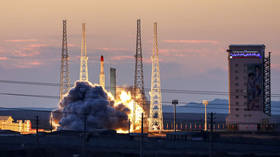6 Dec, 2024 17:35
Iran sends its ‘heaviest payload ever’ into space

Iran has launched its heaviest payload ever into space using its home-grown Simorgh carrier rocket, state television reported on Friday.
The launch included an advanced module for transferring satellites into higher orbits, the Saman-1, as well as the Fakhr-1 communications satellite developed by Iran’s military. Both were “successfully placed in an elliptical orbit with a high point of 410 kilometers,” the broadcast said, according to Reuters.
It added that the weight sent into space, just over 660lbs (300kgs), marked a “national record for the heaviest payload launched into orbit.
The launch comes as tensions between Iran and the West have been growing over conflicts in the Middle East, and over Tehran’s nuclear program, which Western nations, including the US, France, Germany and the UK have branded a “threat” to international security. The West has also accused Tehran of transferring ballistic missiles to Russia amid its conflict with Ukraine.
The Simorgh rocket was launched from the Imam Khomeini Spaceport in the rural Semnan province, some 220 kilometers (about 140 miles) east of Tehran, where its civilian space program is located. Iran used the Simorgh rocket for the first time in January, sending three satellites into space.
A US intelligence report in July suggested that Tehran’s space launch program would probably “shorten the timeline” for it to produce an intercontinental ballistic missile, since similar technologies are used for both systems.
UN Security Council resolutions, which expired in October 2023, urged Iran to halt activities involving ballistic missiles that are capable of carrying nuclear warheads.
Tehran has always maintained that both its nuclear and space programs are entirely peaceful. Under the 2015 Iran nuclear deal, the country agreed to curb its nuclear program in exchange for partial sanctions relief. However, when then-US President Donald Trump unilaterally withdrew from the deal in 2018, diplomatic efforts to revive it failed and Tehran stepped up its uranium enrichment to 60%.
Last year, media reports claimed that the International Atomic Energy Agency (IAEA) was investigating Iran for enriching Uranium to 84%, which is “just 6% below what’s needed for a weapon.” However, Tehran dismissed this at the time as “slander and a distortion of the facts.”
In November, French intelligence claimed Tehran could acquire a nuclear weapon within months, which it called a “most critical threat.”
A senior aide to Iranian Supreme Leader Ayatollah Ali Khamenei confirmed last month, however, that Tehran possesses “the technical capabilities necessary to produce nuclear weapons.” He said while there is no plan to create the weapons, Iran reserves the right to “reconsider” if its survival is under threat.


